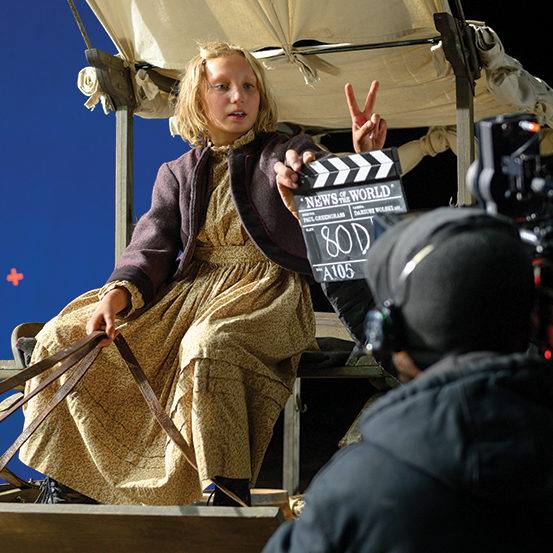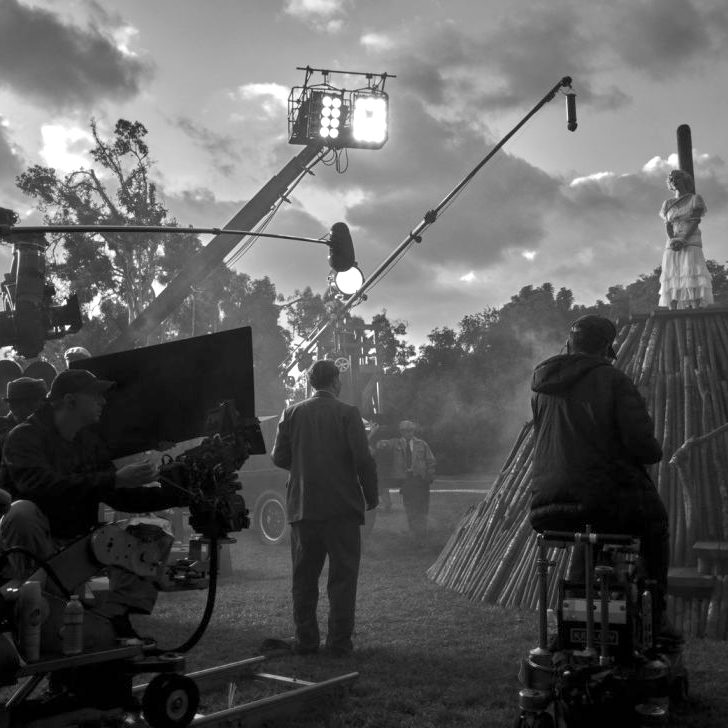93rd Academy Awards: on Best Sound and trips to other worlds
 Sunday, March 28, 2021 at 7:36PM
Sunday, March 28, 2021 at 7:36PM by Eurocheese


More than most years, I felt strongly about which films deserved to be in the conversation for Sound this year. This is the first year since the 1980 Oscars that only one team will receive a Sound prize, and even before 1980, Sound Effects would often receive a special separate prize (sometimes competitively, sometimes as the sole choice). Many Oscar fans learned to explain the difference between Oscar wins for Sound Mixing and Sound Editing, a separation we’ve had since 2003. The Academy has rewarded the Sound Department in every year since the third Oscar ceremony back in 1930, which means the honor has been around even longer than our supporting acting categories.
The nominees this year brought us a wide range of stories – a high seas chase, a Hollywood throwback, a western, an animated film and an immersive film focused on hearing loss. And did you know this year’s Sound category brought us two double nominees?

Ren Klyce is now a nine time nominee, and David Parker, who won Oscars for The English Patient and The Bourne Ultimatum, is now at 11 nominations. They worked together on both Mank and Soul. As part of the five person team working on Mank’s sound design, they created a soundscape that would evoke the old Hollywood we picture when we think of classic film. In interviews, Fincher spoke of how he wanted the film to feel as if it was pulled off an old hidden shelf, preserved so we could experience it as if we were in a theater in the 1940s. The team separately recorded audio for the performances, then applied the old-fashioned sounds separately to dialogue, sound effects and soundtrack. They learned while walking through this process that different voices required different ways of processing this change – for example, some voices easily cut through the muffle placed on them, while others required more finesse (and Oldman’s voice was one of those requiring some additional work). The film is a technical marvel all around, and on my initial viewing I was impressed that the film managed to conjure thoughts of a past era while still remaining clear enough to follow, which was critical considering the film’s dialogue-heavy focus.

It’s interesting that Klyce and Parker (for the sound design) as well as Trent Reznor and Atticus Ross (for the soundtrack) overlap on both Mank and Soul, especially since they are such wildly different films. In Soul, the Sound team needed to create two very specific worlds – the busy streets of New York and an afterlife that sounded nothing like reality. Music was such a central theme of the film that it wouldn’t work if the transitions failed to highlight music’s impact on the main character. Music also connected the two created worlds, and it needed to seamlessly exist in the noisy city as much as the echoing beyond. Director Pete Docter spoke to the team about how the afterlife needed to feel comforting, so along with highlighting the score, they needed to create sounds in a world without boundaries. They discussed the ethereal tone and the importance of mood. Finding the right balance helped separate this world from reality, and helped bring the audience down the rabbit hole. Klyce spoke about creating a world that was ominous but not frightening, which led to experimenting with a number of fun, creative sounds.

Funnily enough, there’s another major overlap in this category – two films centered around Tom Hanks’ central performance. Greyhound tells the story of a US Navy commander helming a ship being stalked by the Germans during World War II. I hadn’t seen the film before writing this article, and from the first moment, the reverberating sound was noticeably used to ratchet up the tension. I wish I’d been able to see this on the big screen, in a theater where the sound design could really shine. The sounds of the water pounding down on the ship, the interior mechanical noises and of course, the explosions were all standouts. One of the Sound team members was Michael Minkler, a 13-time Oscar-nominated sound re-recording mixer who previously won Oscars for Black Hawk Down, Chicago and Dreamgirls. Minkler tracked down the original sounds made by guns used in the films in libraries, then sweetened the sounds with modern elements, making sure each gun sounded unique to reflect the danger facing the characters. I appreciate when Academy members step outside of the typical “awards films” when looking at excellence in craft, and I can certainly see why the sound design of this film appealed to them.

The other Hanks vehicle nominated here was News of the World, a film with epic scope that requires an equally impressive soundscape. Standout scenes included a herd of cattle trotting across the countryside, a horseback chase followed by an intense shootout, and a rising sandstorm that swallows the screen. The sound design team had previously been nominated for films such as Road to Perdition, Captain Phillips, The Martian and 1917, so it’s no surprise they were able to bring resonating sound to this scale. As one of the few films I was able to see on a big screen this year (at the drive in), the combination of the gorgeous cinematography, the lovely score, the authentic feel of the production design and the sound ricocheting through each scene create an impressive backdrop for the film.

Finally, we have a film that built its sound design into its core plotline in a way I’ve never seen before. Director Darius Marder has referred to the sound design of Sound of Metal as a deliberate first person perspective, where rather than describing the hearing loss his main character Rueben (brilliantly and empathetically played by Riz Ahmed) goes through, we experience it ourselves. Early in his scriptwriting process, Marder began building lines in his script around what was being experienced. He made the comment that he looked to hire all storytellers, including his crew members, because he wanted them to bring ideas to the table. By using the sound design to provide a perspective most of us have never had before, the film allows us to imagine the struggle of someone having to navigate a new life without warning. The team also took great care to consider the perspective of the deaf community, and were invited to include moments members relayed, including the dinner scene where Rueben feels out of place as the deaf characters communicate using ASL and physicality. Supervising Sound Editor Nicolas Becker worked hard to balance the sound representing the cochlear implant, adding to the audience’s understanding of what they might feel in Reuben’s shoes. I am very excited for his team, all first time Oscar nominees, and I am so glad sound was used in a way that invited us to peek into a world we normally would never get to explore.
I applaud the Academy choices, and hope that we get to see, or rather hear, work on this level in future years. Congratulations to the nominees.
OTHER CATEGORY REVIEWS
- Adapted Screenplay
- Cinematography
- Costume Design
- Makeup and Hair
- Original Song
- Sound
- Visual Effects
- Documentary Feature
- Shorts, Animated
- Shorts, Doc
- Shorts, Live Action
plus
- Um... who is winning best actress?
- Double acting nomination complications
- How often does Best Actor go to a non-Best Picture nominated film?
- New Oscar records
- History of Posthumous Oscars
- Oldest Best Actor Nominees of all time (two are from this year!)



Reader Comments (7)
For someone who counts Sound of Metal as his favourite film of the year, this is one category I would not give it. It certainly has "Most Obvious Sound Design" going for it, which is why it'll likely coast to a win, but the work on Soul is just as immersive, if nor more so.
Wither the nomination for Vast of Night?
A fun bit of trivia: Sound of Metal is the third Best Sound nominee in the history of the Academy to have the word 'Sound' in the title. The previous two (Breaking the Sound Barrier and The Sound of Music) both won the category.
Both Mixing and Effects teams will win this award this year? Or only mixing??
Fadhil, they submit the entire Sound team so both are included.
Loved Sound of Metal and hope it gets this.
Was I only the only one who trouble hearing Mank? The old-fashioned design and overlapping textures made everything sound faraway and muffled. Every few minutes we’d have to rewind it because we couldn’t hear some obscured dialogue. For that reason alone I would never have nominated it.
I know very little about "Sound" as used in the industry but I routinely tell my friends that sound is one of the hardest things to get right and is the thing that separates professional films from, say, reality TV.
I'm intrigued by this write up on Mank and it almost, almost makes me want to see it again, but that movie still stands as the greatest disappointment of the year for me, but sound was not the problem (looking at you script and cinematography),.
I really can't see how Sound of Metal can lose this category unless people aren't really watching the nominees. It's like a primer on sound and hearing.
Bad luck for "Sounder" missing nod in this category then. :)